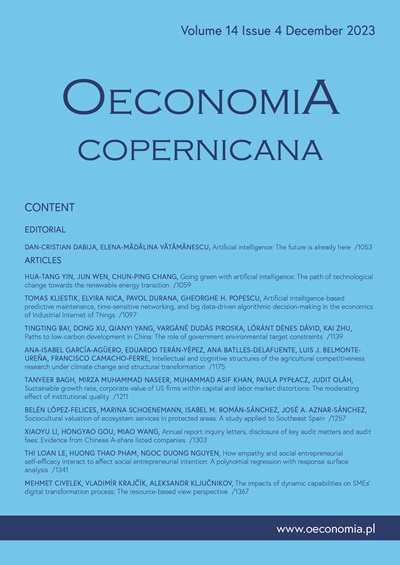How to measure employees’ interests so as to be a more socially-responsible employer: A proposal of a new scale and its validation
IF 7.6
1区 经济学
Q1 ECONOMICS
引用次数: 0
Abstract
Research background: Many authors emphasize that successful human resource management (HRM) practices align with employees’ needs associated with the construct of employees’ interests. In particular, the importance of considering employees’ interests is emphasized in the process of shaping the architecture of Socially Responsible Human Resource Management (SR-HRM) systems. Purpose of the article: The aim of the article is to contribute to understanding employees’ interests by designing and validating a measure to recognize these interests. Methods: Through the use of literature sources and expert opinions, the authors developed a list of employee interests. Empirical data collected via the survey method in Poland was used to statistically verify the measurement scale. In particular, exploratory factor analysis and exploratory structural equation modelling were applied. Findings & value added: This article shows that it is important to create a comprehensive list of interests, as well as validate the research tool used. The newly developed scale has 22 items and five dimensions: support and development at the level of the enterprise, employee participation, support and development at the departmental level, employment security, working conditions and remuneration. It may be used in a variety of companies, as well as in complex research models, and developed further taking into consideration the context of other countries.如何衡量员工的兴趣,从而成为对社会更负责任的雇主?新量表的建议及其验证
研究背景:许多学者强调,成功的人力资源管理(HRM)实践应与员工利益相关的员工需求相一致。特别是,在构建社会责任人力资源管理(SR-HRM)体系的过程中,考虑员工利益的重要性得到了强调:本文旨在通过设计和验证一种识别员工利益的方法,为了解员工利益做出贡献:方法:作者利用文献资料和专家意见,编制了一份员工兴趣清单。通过调查方法在波兰收集的经验数据被用来对测量量表进行统计验证。研究结果与附加价值:本文表明,制定一份全面的兴趣清单以及验证所使用的研究工具非常重要。新开发的量表有 22 个项目和五个维度:企业层面的支持和发展、员工参与、部门层面的支持和发展、就业保障、工作条件和薪酬。该量表可用于各种公司以及复杂的研究模式,并可根据其他国家的情况进一步开发。
本文章由计算机程序翻译,如有差异,请以英文原文为准。
求助全文
约1分钟内获得全文
求助全文
来源期刊

Oeconomia Copernicana
ECONOMICS-
CiteScore
13.70
自引率
5.90%
发文量
26
审稿时长
24 weeks
期刊介绍:
The Oeconomia Copernicana is an academic quarterly journal aimed at academicians, economic policymakers, and students studying finance, accounting, management, and economics. It publishes academic articles on contemporary issues in economics, finance, banking, accounting, and management from various research perspectives. The journal's mission is to publish advanced theoretical and empirical research that contributes to the development of these disciplines and has practical relevance. The journal encourages the use of various research methods, including falsification of conventional understanding, theory building through inductive or qualitative research, first empirical testing of theories, meta-analysis with theoretical implications, constructive replication, and a combination of qualitative, quantitative, field, laboratory, and meta-analytic approaches. While the journal prioritizes comprehensive manuscripts that include methodological-based theoretical and empirical research with implications for policymaking, it also welcomes submissions focused solely on theory or methodology.
 求助内容:
求助内容: 应助结果提醒方式:
应助结果提醒方式:


